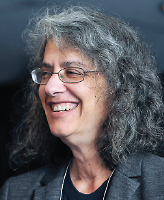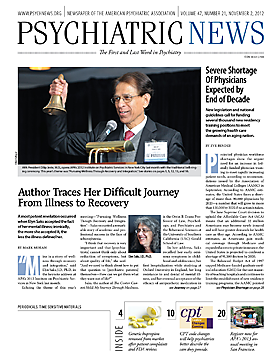Mine is a story of wellness through recovery and integration,” said Elyn Saks, J.D., Ph.D., in the keynote address at APA’s 2012 Institute on Psychiatric Services in New York last month.
Echoing the theme of this year’s meeting—“Pursuing Wellness Through Recovery and Integration”—Saks recounted a remarkable story of academic and professional success in the face of schizophrenia.
“I think that recovery is very important and that [psychiatrists] cannot think only about reduction of symptoms, but about quality of life,” she said. “And we need to think about how to put that question to [psychiatric patients] themselves—How can we get them what they want out of life?”
Saks, the author of The Center Cannot Hold: My Journey Through Madness, is the Orrin B. Evans Professor of Law, Psychology, and Psychiatry and the Behavioral Sciences at the University of Southern California (USC) Gould School of Law.
In her address, Saks recalled her early ominous symptoms in childhood and adolescence, her first hospitalization while studying at Oxford University in England, her long resistance to and denial of mental illness, and her eventual acceptance of the efficacy of antipsychotic medication in combination with psychotherapy in her treatment and recovery.
“I was given a very poor and grave prognosis,” Saks said. “In other words, I was expected to be unable to live independently, let alone to work. And yet it hasn’t turned out that way. My central goals in writing my story are to give hope to people with schizophrenia and understanding to those who don’t have the illness.”
Sparing few details, yet with a great deal of humor, she described the terrifying thoughts that tormented her—and the troubling behavior that occasionally alarmed fellow students and work colleagues—as well as her recovery and academic and professional achievements.
She was the beneficiary of a helpful psychoanalysis during her time at Yale (and she would eventually receive a Ph.D. in psychoanalytic science from the New Center for Psychoanalysis). But it was years later following an episode of acute symptoms when she was on the faculty at USC, and the initiation of a new class of antipsychotic to her treatment, that she accepted the fact of her mental illness and the need for medication.
It was a breakthrough. “I could not deny the truth, and I could not change it,” Saks said of the revelation. “The change [with the new drug] was fast and dramatic. My side effects were lessened, and more important, the clinical result was like daylight dawning after a long night. I could see the world as I never had before. The illness was still there, but it wasn’t pushing me around.
“Perhaps the most profound effect of the new drug was to convince me that I had a mental illness,” Saks continued. “For 20 years I had struggled with this acceptance, managing to hold on to the idea that there was nothing unusual about my thoughts, that everyone’s mind contained the chaos mine did and that others were simply better at managing it…. I wasn’t mentally ill [I thought], I was socially maladroit. Of course, that wasn’t true. There is no way to overstate what a thunderclap this revelation was to me…. But ironically, the more I accepted that I had a mental illness, the less it defined me.”
In introducing Saks, APA President Dilip Jeste, M.D., said the future of psychiatry lies in embracing not just the treatment of acute symptoms but also a new focus on “positive” psychological traits of resilience, optimism, social integration, and wisdom embodied in Saks’ story.
“Recovery is no longer a dream or a fantasy,” Jeste told psychiatrists at the meeting. “It is a reality.”


